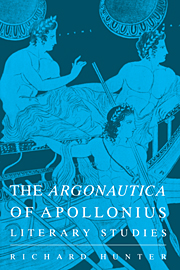Book contents
- Frontmatter
- Contents
- Preface
- List of abbreviations
- 1 Introduction
- 2 Modes of heroism
- 3 Images of love
- 4 The gods and the divine
- 5 The poet and his poem
- 6 The Argonautica and its Ptolemaic context
- 7 Argonautica and Aeneid
- Appendix: ἓν ἂισμα διηνκές: Aristotle, Callimachus, Apollonius
- Bibliography
- General index
- Index of passages discussed
4 - The gods and the divine
Published online by Cambridge University Press: 02 December 2009
- Frontmatter
- Contents
- Preface
- List of abbreviations
- 1 Introduction
- 2 Modes of heroism
- 3 Images of love
- 4 The gods and the divine
- 5 The poet and his poem
- 6 The Argonautica and its Ptolemaic context
- 7 Argonautica and Aeneid
- Appendix: ἓν ἂισμα διηνκές: Aristotle, Callimachus, Apollonius
- Bibliography
- General index
- Index of passages discussed
Summary
The authority of Homer secured for the Homeric gods a central place in subsequent epic; epic poetry without these gods was almost unthinkable (at any rate before Lucan). Already in the Odyssey itself ‘the doings of men and gods’ is almost a definition of epic song (Od. I.338). Despite this, the nature and interpretative strategies demanded by the gods of epic remain hotly disputed critical areas; this is hardly surprising, as by their very nature such gods raise (and are used by post-Homeric poets to raise) fundamental methodological problems about writing and reading ‘epic’.
In an influential discussion of Homer's gods, Jasper Griffin insisted that they are (or often are) ‘numinous’ and ‘to be taken seriously’; they are not in the poems merely for light relief or as narrative ‘devices’ or weapons of psychological explanation. Moreover, he argues, Homeric characters react to their gods in ways which can be paralleled from ‘true’ religious experience and which betray the representation of ‘a world which contains real gods’. At one (fairly banal) level, this is obviously true of the Argonautica, regardless of the Homeric situation. The common motifs of the foundation of cult after divine epiphany or intervention and the building of altars and shrines at stops along the way are not merely the actions of pious heroes in a world full of gods, but also correspond to the real practice of Greek religion, which was indeed centred around the observance and propagation of cult.
- Type
- Chapter
- Information
- The Argonautica of Apollonius , pp. 75 - 100Publisher: Cambridge University PressPrint publication year: 1993



